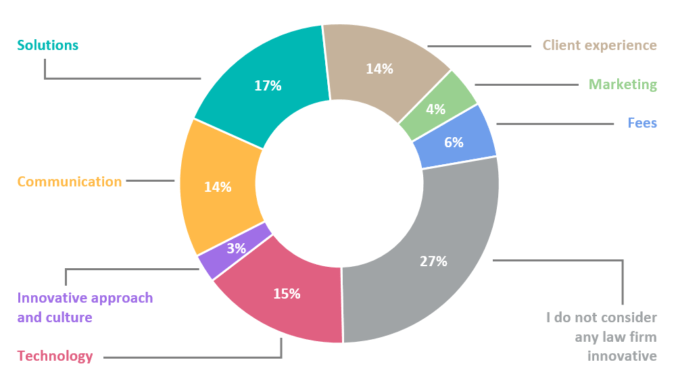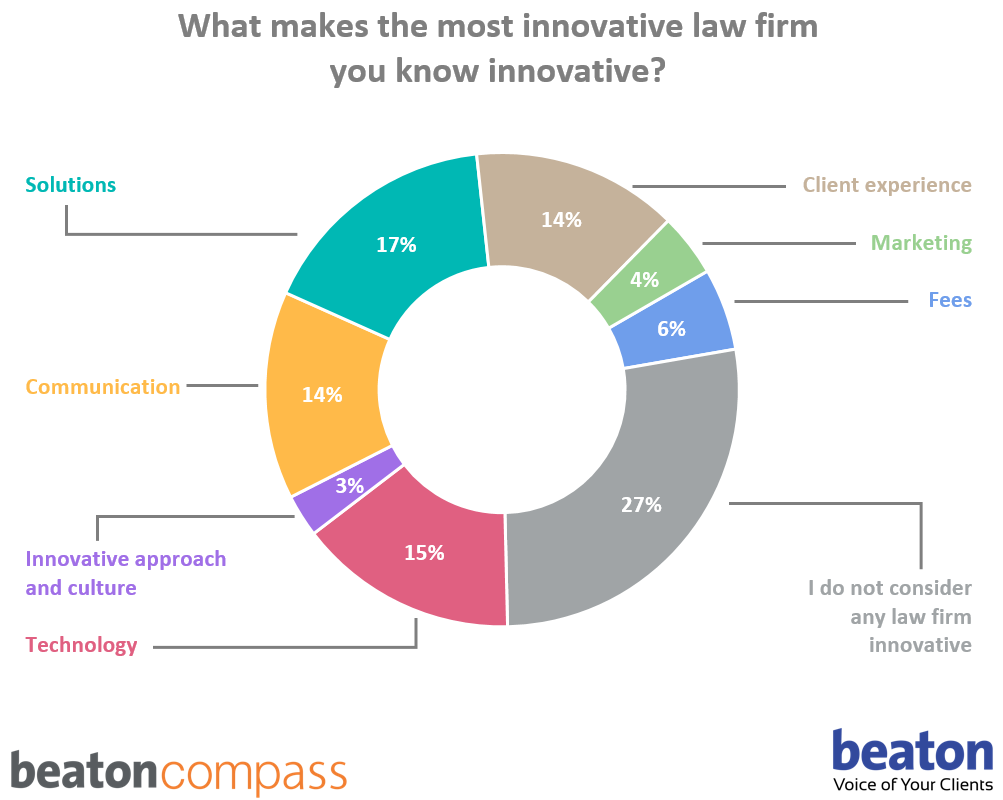
New research by Australian legal consultant, George Beaton, has revealed that client perceptions of law firm ‘innovation’ are at best mixed.
The ‘Client-led Innovation in Legal Services’ report included an illuminating survey of 154 clients of Australian law firms, a third of whom identified themselves as in-house lawyers or General Counsel, and included respondents with a variety of executive positions inside companies.
The survey group were asked: ‘What makes the most innovative law firm you know innovative?‘ The results are shown below.
As you can see, 27% of respondents said that ‘I do not consider any law firm [to be] innovative’, or over a quarter. While just 3% said they had identified an ‘Innovative approach and culture’ among their law firms as the factor that stood out.
However, this was balanced out a little by 15% of clients also saying they saw ‘technology’ use as innovative among their advisers, and 17% saw the provision of ‘solutions’ as meeting the criteria, which perhaps paints a slightly more positive side to the picture.
So, what does this mean? First up, the report author, George Beaton, CEO of the eponymous consulting group.
‘Numbers of the key findings in our Client-led Innovation in Legal Services report will surprise law firms. Not least this one: When asked ‘What makes law firms innovative’ only 15% of the in-house lawyers and c-suite executives cited some attribute related to technology,’ he said.
‘To us as researchers, this is not surprising; in-house lawyers grapple daily with many more things where innovations, other than technology, would make a big difference to getting work done in a better, faster and cheaper way,’ he added.
The report also states that ‘…of the law firms that were nominated as innovative, two-thirds were not the primary firm for the respondent. It seems most clients need to look over the fence to find innovative firms; and then the question is: are these firms amenable to and capable of helping?’
Beaton’s report importantly adds: ‘All this means effective innovation is fast becoming a (the?) determinant of success, even survival, for the supply and demand sides of the market.’
It then concludes: ‘To test the well-known truism that a professional services provider can only be as good as their client will allow we asked the respondents how important innovation was to achieving their job-related KPIs. One-third said ‘Very important’ and of these eight in ten said advice from outside law firms on new technologies and processes was important. Clearly there is pent-up, unmet demand.’
So, there you go. Clients do care about innovation that helps them, but they are not seeing enough of it from law firms; that is perhaps the key message.
Moreover, in a highly competitive market, providing new solutions that help the client (hint, hint) rather than just provide internal operational support like a nice DMS or CRM system, are where the battle will be fought.
The report also triggers a thought that Artificial Lawyer has been mulling over for some time: ‘Is innovation only in the eye of the beholder?’
The answer has to be: yes. What is innovation but the answering of a problem with a new solution? However, the key issue is: whose problem is it and who does it matter to?
For example, law firm X spends a fortune on a massive, enterprise level DMS. It’s a lovely piece of kit and has all sorts of bonus features, which all the partners agree is very ‘innovative’. The clients…? Well, they probably appreciate the fact that the documents they send to their law firm don’t get lost and can be retrieved again quickly, but is this innovation to the client?
The answer: probably not. To the client a nice DMS being used by their law firm is what management consultants like to call ‘a hygiene issue’, i.e. it’s a baseline for doing business and adds no significant differential value to the buyer of services. This is because all other major law firms also have this internal operational capacity. You only notice operational or, ‘utility legal tech’, when it’s not there or it breaks down. It adds no visible value to the client. Hence, it is not strategic in nature (hint, hint).
But, let’s say a law firm works with, for example, an expert systems builder, to create an outward facing knowledge system that helps clients answer hard, but low value legal questions via an automated system. Some lawyers in the firm may not see this as innovation, but rather ‘cannibalism’ or ‘heresy’. However, the clients – who perhaps have not seen this before – may well say: ‘Nice, now that’s what I call innovation that actually helps me. I like this firm!’
QED, innovation is a subjective experience. But, as Beaton shows in the survey, from the client perspective law firms are missing a trick to delight and to retain goodwill, possibly at the risk of losing competitive advantage in the years to come.
